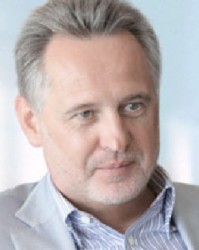MOSCOW/KIEV, (Reuters) – In Russia, powerful friends helped him make a fortune. In the United States, officials want him extradited and put behind bars. In Austria, where he is currently free on bail of $155 million, authorities have yet to decide what to do with him.
He is Dmitry Firtash, a former fireman and soldier. In little more than a decade, the Ukrainian went from obscurity to wealth and renown, largely by buying gas from Russia and selling it in his home country. His success was built on remarkable sweetheart deals brokered by associates of Russian leader Vladimir Putin, at immense cost to Russian taxpayers, a Reuters investigation shows.

Russian government records reviewed for this article reveal for the first time the terms of recent deals between Firtash and Russia’s Gazprom, a giant gas company majority owned by the state.
According to Russian customs documents detailing the trades, Gazprom sold more than 20 billion cubic metres of gas well below market prices to Firtash over the past four years – about four times more than the Russian government has publicly acknowledged. The price Firtash paid was so low, Reuters calculates, that companies he controlled made more than $3 billion on the arrangement.
Over the same time period, other documents show, bankers close to Putin granted Firtash credit lines of up to $11 billion. That credit helped Firtash, who backed pro-Russian Viktor Yanukovich’s successful 2010 bid to become Ukraine’s president, to buy a dominant position in the country’s chemical and fertiliser industry and expand his influence. The Firtash story is more than one man’s grab for riches. It demonstrates how Putin uses Russian state assets to create streams of cash for political allies, and how he exported this model to Ukraine in an attempt to dominate his neighbour, which he sees as vital to Russia’s strategic interests. With the help of Firtash, Yanukovich won power and went on to rule Ukraine for four years. The relationship had great geopolitical value for Putin: Yanukovich ended up steering the nation of more than 44 million away from the West’s orbit and towards Moscow’s until he was overthrown in February. “Firtash has always been an intermediary,” said Viktor Chumak, chairman of the anti-corruption committee in the previous Ukrainian parliament. “He is a political person representing Russia’s interests in Ukraine.” A spokesman for Putin rejected claims that Firtash acted on behalf of Russia. “Firtash is an independent businessman and he pursues his own interests, I don’t believe he represents anyone else’s interests,” said Dmitry Peskov.
The findings are the latest in a Reuters examination of how elites favoured by the Kremlin profit from the state in the Putin era. In the wild years after the fall of the Soviet Union, state assets were seized or bought cheaply by the well connected. Today, resources and cash flows from public enterprises are diverted to private individuals with links to Putin, whether in Russia or abroad.
Putin’s system of comrade capitalism has had huge costs for the ordinary people of Russia: By granting special cheap deals to Firtash, Gazprom missed out on about $2 billion in revenue it could have made by selling that gas at market prices, according to European gas price data collected by Reuters. Four industry analysts said that Gazprom could have sold the gas at substantially higher prices to other customers in Europe.
At the same time, the citizens of both Russia and Ukraine have seen unelected oligarchs wield political influence. Firtash, whose main company, Group DF, describes him as one of Ukraine’s leading entrepreneurs and philanthropists, was arrested in Austria on March 12 at the request of U.S. authorities. The Americans accuse him of bribery over a business deal in India unrelated to events examined in this article. Firtash denies those allegations and is currently free on bail.
Firtash imported the cheap Russian gas through a Cypriot company of which he is sole director, and a Swiss one set up by Group DF. He and Group DF declined to answer questions about those two companies and their gas dealings. A spokesman said Firtash was not available to discuss his business operations, and that Group DF did not wish to comment on “any of the questions you put forth.”
The Kremlin spokesman Peskov said Putin has met Firtash but that they are not close acquaintances. He said Russia supplied gas at “lower prices” to Ukraine because Yanukovich had asked for it and Russia wanted to help Ukraine’s petrochemical industry. Peskov said the deals were arranged through Firtash because “the Ukrainian government asked for it to be that way.”
Yanukovich, who fled to Russia in February after mass demonstrations against his government, could not be reached for comment.
From the moment he first became Russia’s president, Putin moved to take control of his country’s most valuable resource: natural gas. After assuming power in 2000, he replaced the management of Gazprom, put trusted allies in charge, and ensured the Russian state controlled more than half the shares.
The corporate behemoth now supplies about a third of Europe’s gas, generating vital revenue for Russia and giving Putin a powerful economic lever. “Gazprom is very much a tool of Russian foreign policy,” says Rem Korteweg, senior research fellow at the Centre for European Reform. Every major deal that Gazprom signs is approved by Putin, people in the energy industry say.




